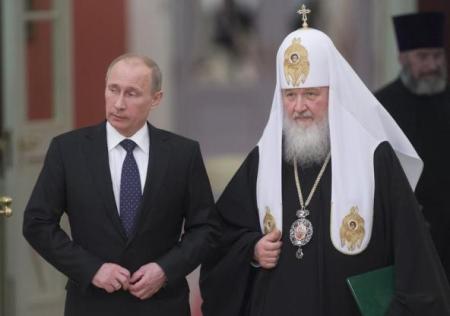Ukrainian Orthodox Church severs ties with Moscow over Patriarch Kirill's support for Putin's war

A branch of Ukraine's Orthodox Church announced Friday that it's breaking from Russia over President Vladimir Putin's invasion of Ukraine, declaring its "full independence" against Russia's spiritual authorities.
The decision followed a meeting of the church leadership. In a statement, its council condemned Russia's Feb. 24 invasion of Ukraine and Patriarch Kirill, the head of Russia's church, for supporting the "special military operation" in Ukraine.
"The council has approved the corresponding additions and changes to the Statute on the Management of the Ukrainian Orthodox Church, indicating the full autonomy and independence of the Ukrainian Orthodox Church," the council said in a statement published on its page Friday.
Kirill has backed the war in a series of sermons, calling for Russians to "rally around" the authorities, accusing "enemies" of attempting to destroy the unity between Russia and Ukraine.
On Sunday, the Moscow church leader released a statement in response to the decision by its branch in Ukraine to cut ties.
"We fully understand how the Ukrainian Orthodox Church is suffering today," Kirill said, according to The Moscow Times.
The church leader and Putin ally warned that the "spirits of malice" are trying to divide the Orthodox people of Russia and Ukraine but insisted they would not succeed.
Former DIA Intelligence Officer and Putin's Playbook author Rebekah Koffler described the Ukraine Orthodox Church's move as a "huge blow" to Putin.
In an interview with Fox News Digital, Koffler said "Kirill and Putin are buddies," adding that Russia's president "has weaponized the Russian Orthodox religion as a geopolitical tool."
"The idea of Putin unifying the Russian world, including Ukraine and other post-Soviet states, hinges on the idea that Russia is the center of Christianity and the center of the unique Eurasian civilization that the Russians believe is exceptional just like Americans think America is exceptional," the analyst said. "Once the church splits, it takes the whole divinity idea out of it."
The analyst speculated that it was unlikely that the Ukrainian Orthodox Church would join the Kyiv-based Orthodox Church Ukraine after declaring its independence. She predicted that some Ukrainian Orthodox parishes would remain in Moscow, however, despite the decision.
"With Russian forces gradually but steadily establishing control over Eastern and Southern Ukraine — Putin's primary goal at this phase of the war — they have to balance their parishioners' interests," Koffler explained. "Some of the priests may decide to stick with Moscow, in order to survive a possible new regime if Putin succeeds in securing full control of Donbas and establish the so-called 'Novorossiya' (new Russia)."
The analyst noted that the split is likely due to Putin's targeting of civilians to put pressure on Ukrainian President Volodymyr Zelenskyy. According to the U.N. Office of the High Commissioner for Human Rights, at least 3,930 people have been killed, 4,532 have been injured, and more than 6 million have fled their homes since the invasion began.
"Regardless of whose side you're on, even if you buy into Putin's explanation for why he's doing it, you can't, as a spiritual person, condone civilian deaths," Koffler said.
"Bottom line, the split punches a hole in Putin's narrative that the Russians and Ukrainians are spiritually and ethnically one people and therefore Ukraine should not exist as a separate country."
In July 2019,more than 500 congregations joined the newly created Orthodox Church of Ukraine seven months after it left the Russian-affiliated church and was granted autocephaly. Patriarch Bartholomew I of Constantinople, the "first among equals" in the Orthodox Church, allowed the creation of an independent church in Ukraine.
Many in the Eastern European nation had requested the new church in response to Russia's 2014 annexation of the Crimea from Ukraine. The Russian Orthodox Church announced in October it was severing ties with the central Orthodox Church community in protest of the decision.
The Ukrainian invasion has led to tense relations between the Russian Orthodox Church and other parishes.
In March, the Russian Orthodox Parish of Saint Nicholas of Myra in Amsterdam announced on Facebook it was seeking to leave the Russian Orthodox Church in opposition to Kirill's support for the Ukrainian invasion. The announcement was "extremely painful and difficult for all concerned" and came in response to what the parish called a "threat to the parish and the clergy."
The parish said it filed a request for "canonical dismissal" and "also sent a request to Metropolitan Athenagoras of Belgium, the Netherlands and Luxembourg (Ecumenical Patriarchate of Constantinople) to be received into his diocese."
Amid ongoing tensions between the Ukrainian Orthodox Church and the Russian Orthodox Church as the war continues, a Christian radio broadcaster called on Christians in both regions to unite.
"This is a great time for the church in Ukraine to be strong and be an example and witness for Christ, knowing that God is in control, God is sovereign, and everything is according to His plan, so we don't worry about it," Daniel Johnson, founder of New Life Radio satellite network based in Odessa, Ukraine, said in an interview with The Christian Post before the war began in February.
"We go on the air explaining to Christians that this is their time, this is their time to be a witness for Christ, and it's really a wonderful opportunity for the Church despite all the chaos that can be happening here."
Johnson said the Evangelical community in Ukraine is "working mainly to just put the word of God out there ... to the general public and even to the Orthodox listeners who like to listen. We're teaching them the word of God and saying, 'Trust the Lord and your ultimate allegiance is to Jesus, not to the leadership of any one country that … you find yourself in."





















